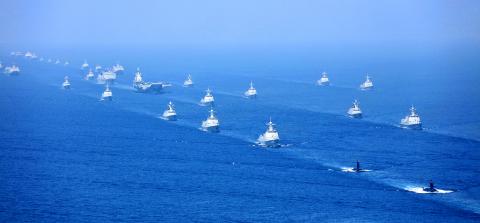The US might propose military cooperation with Taiwan, a military official said, citing US Vice President Mike Pence’s harsh criticism of China.
In remarks delivered on Thursday at the Hudson Institute on US policy regarding China, Pence criticized Beijing, saying it is threatening stability across the Taiwan Strait and is using economic aggression to extend its global reach.
The official, who declined to be named, said that Pence’s criticism of China was an assurance to US allies in the Western Pacific that Washington would continue to maintain security in the region.

Photo: AP
It is likely that concrete and substantial US action would follow, the official said.
The action is likely to take the form of military exchanges, probably on an unprecedented scale, “exceeding Taiwan’s expectations,” the official said.
US President Donald Trump on Aug. 13 signed the US National Defense Authorization Act for Fiscal Year 2019, which contains provisions favorable to Taiwan’s defense.
The legislation says that the US should bolster defense and security cooperation with Taiwan; support the nation’s acquisition of defensive weapons through foreign military sales, direct commercial sales and industrial cooperation; and improve the predictability of arms sales to Taiwan by ensuring timely review of and response to requests for defense articles and services.
The legislation also suggests that the US secretary of defense send a hospital ship to Taiwan as part of the annual Pacific Partnership mission to improve disaster response planning and preparedness.
The US Defense Security Cooperation Agency on Sept. 24 said that the US Department of State had approved a proposal to sell US$330 million in arms to Taiwan to upgrade the nation’s defense capabilities.
The sale is to cover standard spare parts, as well as the repair or replacement of spare parts for Republic of China Air Force aircraft, such as its General Dynamics F-16s, Lockheed C-130s, Northrop F-5s, and Aerospace Industrial Development Corp (漢翔航空工業) Indigenous Defense Fighters.
The military official cited CNN reports as saying that the US plans a show of force next month in areas near Chinese-claimed territory in the South China Sea and Taiwan Strait.
If true, such a move would be in line with the intent of Pence’s speech, the official said.
The plans would not only serve as a warning to Beijing, but also as a message that Chinese efforts to prevent the US from aiding its allies in the Western Pacific are doomed to fail, the official said, quoting Pence.

Conflict with Taiwan could leave China with “massive economic disruption, catastrophic military losses, significant social unrest, and devastating sanctions,” a US think tank said in a report released on Monday. The German Marshall Fund released a report titled If China Attacks Taiwan: The Consequences for China of “Minor Conflict” and “Major War” Scenarios. The report details the “massive” economic, military, social and international costs to China in the event of a minor conflict or major war with Taiwan, estimating that the Chinese People’s Liberation Army (PLA) could sustain losses of more than half of its active-duty ground forces, including 100,000 troops. Understanding Chinese

The Ministry of Foreign Affairs (MOFA) yesterday said it is closely monitoring developments in Venezuela, and would continue to cooperate with democratic allies and work together for regional and global security, stability, and prosperity. The remarks came after the US on Saturday launched a series of airstrikes in Venezuela and kidnapped Venezuelan President Nicolas Maduro, who was later flown to New York along with his wife. The pair face US charges related to drug trafficking and alleged cooperation with gangs designated as terrorist organizations. Maduro has denied the allegations. The ministry said that it is closely monitoring the political and economic situation

UNRELENTING: China attempted cyberattacks on Taiwan’s critical infrastructure 2.63 million times per day last year, up from 1.23 million in 2023, the NSB said China’s cyberarmy has long engaged in cyberattacks against Taiwan’s critical infrastructure, employing diverse and evolving tactics, the National Security Bureau (NSB) said yesterday, adding that cyberattacks on critical energy infrastructure last year increased 10-fold compared with the previous year. The NSB yesterday released a report titled Analysis on China’s Cyber Threats to Taiwan’s Critical Infrastructure in 2025, outlining the number of cyberattacks, major tactics and hacker groups. Taiwan’s national intelligence community identified a large number of cybersecurity incidents last year, the bureau said in a statement. China’s cyberarmy last year launched an average of 2.63 million intrusion attempts per day targeting Taiwan’s critical

AGING: As of last month, people aged 65 or older accounted for 20.06 percent of the total population and the number of couples who got married fell by 18,685 from 2024 Taiwan has surpassed South Korea as the country least willing to have children, with an annual crude birthrate of 4.62 per 1,000 people, Ministry of the Interior data showed yesterday. The nation was previously ranked the second-lowest country in terms of total fertility rate, or the average number of children a woman has in her lifetime. However, South Korea’s fertility rate began to recover from 2023, with total fertility rate rising from 0.72 and estimated to reach 0.82 to 0.85 by last year, and the crude birthrate projected at 6.7 per 1,000 people. Japan’s crude birthrate was projected to fall below six,